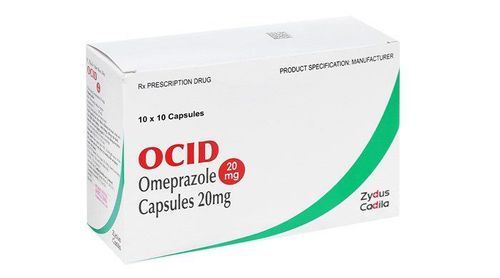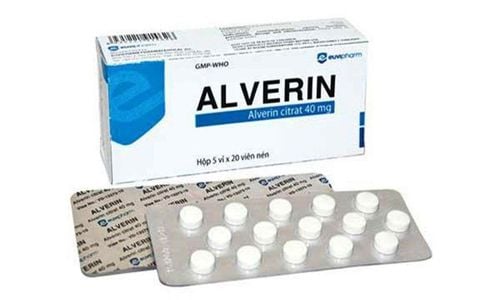This is an automatically translated article.
Assozole is prepared in the form of capsules containing gastric antacid tablets, with the main ingredient being Omeprazole. The drug is used in the treatment of gastrointestinal ulcers, gastro-oesophageal reflux,...
1. What is Assozole?
What is the use of Assozole? 1 tablet Assozole has the main ingredient is Omeprazole 20mg. Omeprazole is a specific inhibitor, acting by blocking the enzyme system of Hydrogen-potassium Adenosine Triphosphatase, also known as the proton pump H + K + ATPase of gastric parietal cells. Omeprazole acts on the terminal phase of acid secretion. A single dose of Omeprazole 20 mg/day rapidly inhibits gastric secretion caused by all stimulants. Omeprazole causes a long-term but reversible decrease in gastric acid. 5 days after discontinuing the drug, gastric secretion returns to normal but there is no increased acid secretion. On endoscopic examination, the scar wall rate of duodenal ulcer reached 65% after 2 weeks of drug use and reached 95% after 4 weeks.
Indications for the use of Assozole:
Treatment of gastrointestinal ulcers; Treatment of gastroesophageal reflux syndrome; Treatment of Zollinger-Ellison syndrome. Contraindications to the use of Assozole:
Patients with hypersensitivity to Omeprazole, Esomeprazole, other benzimidazole derivatives (such as lansoprazole, pantoprazol, rabeprazole) or other ingredients of the drug.
2. How to use and dose Assozole
Usage: Orally. The patient should swallow the tablet whole, do not crush or chew it.
Dosage:
Reduce indigestion symptoms caused by excess acid: Use dose 10mg/day or 20mg/day for 2-4 weeks; Treatment of gastroesophageal reflux syndrome - oesophagitis: Usual dose: 20mg/time/day for 4 weeks. After that, use another 4 - 8 weeks if not completely cured; Maintenance dose: 10mg/day; Treatment of persistent esophagitis: Usual dose: 40mg/day; Maintenance dose: 20mg/time/day; Treatment of peptic ulcers: Single dose: 20mg/day or in severe cases, 40mg/day. Treatment should be continued for 4 weeks for duodenal ulcers and 8 weeks for gastric ulcers. Maintenance dose is 10-20mg/time/day; To destroy Helicobacter pylori (HP) in peptic ulcers: Omeprazole can be combined with other antibiotics in 2 or 3 drug therapy. With therapy 2, use Omeprazole 20mg/time x 2 times/day for 2 weeks. With therapy 3, use Omeprazole 20mg/time x 2 times/day for 1 week; Treatment of gastric ulcers caused by non-steroidal anti-inflammatory drugs (NSAIDs): Use a dose of 20mg/day. A dose of 20mg/day is also used for prevention in patients with a history of gastric and duodenal injury requiring continued non-steroidal anti-inflammatory drug therapy; Treatment of Zollinger - Ellison syndrome: Use a dose of 60mg / time / day, the dose can be adjusted if necessary. Most patients are effectively controlled with doses ranging from 20 to 120 mg/day, but doses up to 120 mg 3 times/day can be used. With a daily dose of over 80mg, it should be divided into 2 doses; Prevention of risk of acid aspiration during general anesthesia: 40mg the night before surgery, another 40mg about 2-6 hours before surgery; Patients with renal impairment: No need to change the dose; Patients with liver failure: Use a dose of 10 - 20mg/day; Elderly (over 65 years old): No need to change the dose; Children: There is limited experience with the use of Omeprazole in children. Overdose, missed dose: Patients need to notify the doctor to receive advice on the most appropriate treatment.
3. Assozole side effects
When using Assozole, patients may experience some side effects such as:
Common: Drowsiness, headache, dizziness, nausea, vomiting, diarrhea, abdominal pain, bloating, constipation ; Uncommon: Insomnia, fatigue, dizziness, confusion, urticaria, skin pruritus, rash, increased transaminases (reversible); Rare: Sweating, peripheral edema, hypersensitivity (angioedema, fever, anaphylaxis); Thrombocytopenia, leukopenia, reduction in whole blood cells, agranulocytosis; Large breasts in men; Reversible confusion, depression, hallucinations, agitation in elderly and especially seriously ill patients, hearing disorders; Dry mouth, Candida infection, gastritis; Jaundice/non-jaundice hepatitis, encephalopathy in patients with liver failure; Muscle pain, joint pain; Bronchospasm; Interstitial nephritis. When experiencing side effects of Assozole, patients should promptly notify their doctor to receive advice on the most appropriate treatment and response.
4. Be careful when using Assozole
Before and while taking Assozole, the patient should note:
If the patient has symptoms such as prolonged vomiting, heavy weight loss, difficulty swallowing, vomiting blood, black stools, suspected or ongoing stomach ulcer The possibility of malignancy should be excluded because treatment with Assozole can reduce symptoms and delay diagnosis; Proton pump inhibitors such as Assozole should not be used in combination with atazanavir. If it is necessary to use a combination drug, it is necessary to closely monitor the clinical manifestations of the patient such as viral infection, in combination with increasing the dose of atazanavir to 400mg and 100mg of ritonavir, no need to increase the dose of Omeprazol; Like other acid blockers, Omeprazole may decrease the absorption of vitamin B12 due to a decrease or lack of hydrochloric acid. Therefore, this factor should be considered in patients with reduced body stores or at risk of reduced vitamin B12 absorption if the drug is used for long-term treatment; Omeprazole is an inhibitor of CYP2C19. Therefore, when starting or ending treatment with omeprazole, the risk of drug interactions with drugs metabolised via CYP2C19 should be considered. When monitoring drug interactions between omeprazole and clopidogrel, the clinical relevance of this interaction is unknown. However, to ensure safety, it is best not to take Omeprazole and clopidogrel at the same time; Severe hypomagnesaemia has been reported in patients treated with proton pump inhibitors for at least 3 months (in most cases about 1 year). Symptoms of severe hypomagnesaemia may include fatigue, delirium, convulsions, muscle spasms, dizziness, ventricular arrhythmias, ... but often occur insidiously, unnoticed. In the majority of patients with hypomagnesaemia, the condition improves after magnesium supplementation and discontinuation of proton pump inhibitors such as omeprazole; It is advisable to measure the patient's magnesium levels before initiating treatment and periodically during treatment for patients who require long-term therapy or who require proton pump inhibitors concomitantly with digoxin or other drugs known to cause adverse effects. other hypomagnesaemia (such as diuretics); Use of proton pump inhibitors, especially at high doses and for a long time (more than 1 year), may slightly increase the risk of fractures of the spine, wrists, and hips (mainly in the elderly or in the elderly). people with other risk factors). Patients at risk of osteoporosis should be cared for according to existing guidelines and should be adequately supplemented with vitamin D and calcium; On experimental studies, Omeprazole did not have the potential to cause harm to the fetus, but it is best not to use this drug for pregnant women, especially in the first 3 months; The use of Omeprazole in lactating women is not recommended; Omeprazole has almost no influence on the ability to drive or use machines. However, because the drug can cause dizziness and visual disturbances, if these symptoms occur, the patient should not drive or operate machinery. When using Assozole, the patient should strictly follow the instructions and instructions of the doctor on dosage, route of administration, duration of the drug, ... Patients should also inform the doctor about the drugs they are taking. use, the diseases I have had, allergic conditions, ... for appropriate consideration and adjustment, to avoid the risk of unpredictable drug interactions.
Follow Vinmec International General Hospital website to get more health, nutrition and beauty information to protect the health of yourself and your loved ones in your family.
Please dial HOTLINE for more information or register for an appointment HERE. Download MyVinmec app to make appointments faster and to manage your bookings easily.













